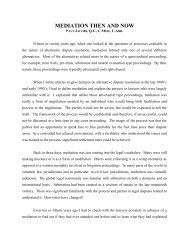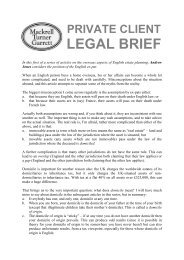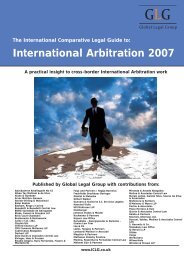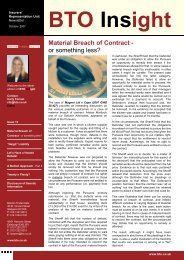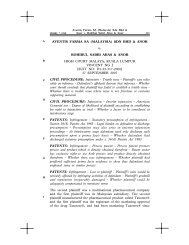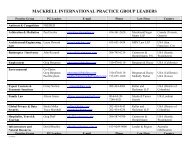Mergers & Acquisitions - Mackrell International
Mergers & Acquisitions - Mackrell International
Mergers & Acquisitions - Mackrell International
You also want an ePaper? Increase the reach of your titles
YUMPU automatically turns print PDFs into web optimized ePapers that Google loves.
izconsult law LLCVietnam• using inside information to purchase or sell securities for oneselfor for a third party; disclosing or supplying inside informationor advising another person to purchase or sell securities on thebasis of inside information;• colluding in the purchase and sale of securities aimed at creatinga false supply and demand; trading securities in the form of colludingwith or persuading others to continuously purchase andsell in order to manipulate the price of securities; combining theaforementioned methods or using other trading methods in orderto manipulate the price of securities; or• implementing the securities trading activities without the SSC’sapproval.8 Approval and appraisal rightsWhat approval rights do shareholders have over businesscombinations? Do shareholders have appraisal or similar rights inbusiness combinations?Under the Law on Enterprises, any proposals for the issuance of newshares or disposing of assets of material amounts of the company, ora merger or consolidation shall require the approval of shareholderspresent and voting in person or by proxy representing at least 75 percent of the voting rights.An offer price for shares of a public company must not be lowerthan the average price of the shares published by the stock exchangeduring the 60 days preceding the submission of the offer to the SSCor the average prices of the shares listed by at least two securitiescompanies in the 60 days preceding the submission of the offer tothe SSC.Where a transaction involves state-owned companies, the transactionprice for a strategic investor must not be lower than the averagesuccessful auction prices. Assets of state-owned companies willneed to be appraised in accordance with strict procedures and determinedthrough a competitive method, such as auction or bidding.9 Hostile transactionsWhat are the special considerations for unsolicited transactions?The recently amended Securities Law establishes three situationswhere the investor acquiring voting shares, fund certificates of thepublic company or closed-end fund must tender a general offer toacquire:• if the proposed acquisition results in the investor owning 25 percent or more of voting shares, fund certificates that are issuedand outstanding;• organisations or individuals and related persons holding 25 percent or more of voting shares, fund certificates to purchase 10per cent or more of voting shares or fund certificates, which areissued and outstanding; and• organisations or individuals and related persons holding 25 percent or more of voting shares, certificates of closed-end fund tocontinue the purchase of 5 per cent to less than 10 per cent ofthe voting shares, fund certificates in less than one year after thecompletion of a previous general tender offer.In addition, the amended law provides for six exempted situationsthat are not subject to public offering:• if the proposed acquisition results in the investor owning morethan 25 per cent or more of the newly issued voting shares, fundcertificates according to the issuance plan already passed byGSM of the public company or fund representative board of theclosed-end fund;• if the proposed acquisition results in the investor owning 25per cent or more of the voting shares, fund certificates that arealready approved by GSM of the public company or fund representativeboard of the closed-end fund;• internal transfer of shares between holding company andsubsidiaries;• gift, inheritance or share certificates;• transfer under the court’s decision; and• other transactions as provided by the Ministry of Finance.Generally, the investor must follow the following process in atakeover:• submit a tender offer to the SSC and send a copy to the target;• the target makes an announcement of the offer within three days;• the SSC gives its opinions within seven days;• the board must send its opinions regarding the offer to the SSCand shareholders of the target within 14 days. The board’sopinions must be in writing and signed by two-thirds of theboard members;• the investor must make an announcement in three consecutiveissues of a printed or online newspaper and the website of thestock exchange where the shares are listed, within seven daysfrom its receipt of the SSC’s opinion;• the investor must report the results of the offer to the SSC within10 days from completion of the offer and at the same time makea public announcement on the result of the offer;• the investor must appoint a securities company as an agent conductingthe offer; and• the offer period must be no shorter than 30 days and no longerthan 60 days.It is noted foreign ownership of shares of a public company is cappedat 49 per cent. In addition, where an investor acquires newly issuedshares of a company in a private share placement the investor isrestricted from selling the shares within one year.10 Break-up fees – frustration of additional biddersWhich types of break-up and reverse break-up fees are allowed?What are the limitations on a company’s ability to protect deals fromthird-party bidders?Vietnamese law does not prohibit or otherwise regulate break-upfees and reverse break-up fees. Generally, the parties may agree onthe fees, but the amounts may not be more than 8 per cent of thetransaction value if they are considered as a penalty. Furthermore, theaggrieved party can request for damages for loss. The value of damagesfor loss shall comprise the value of the actual and direct loss thatthe aggrieved party has suffered due to the breach as well as the directprofits the aggrieved party would have earned had such breach notbeen committed. Additionally, though not specifically regulated, thefees should be fully disclosed in the offer document that is registeredwith the SSC and the offer announcement. The break-up fees wouldalso be approved by the shareholders of the target. Where the transactionis between affiliated companies, issues such as transfer pricingand related-party transactions should be considered. If the fees are tobe paid to a foreign party it will raise foreign exchange issue as well.We are not aware of any provisions that prohibit or restrictfinancial assistance in business combinations.Vietnamese law does not place limitations on a company’s abilityto protect deals from third-party bidders. As mentioned above, theboard of the target must send its opinions regarding a takeover offerto the SSC and shareholders within 14 days. The board’s opinionsmust be in writing and signed by two-thirds of the members of theboard. If the board objects to the offer, it is unclear whether the dealcan proceed or be aborted. We note that except for some special circumstances,shareholders are not restricted from selling their shares.www.gettingthedealthrough.com 413






